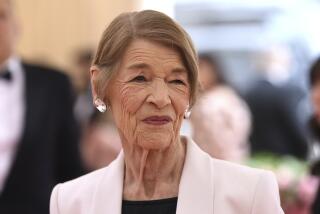Barbara Castle, 91; British Politician
- Share via
Barbara Castle, the fiery Red Queen of Britain’s Labor Party who held several Cabinet posts under Prime Minister Harold Wilson but crippled a brilliant career when she crossed swords with her country’s powerful trade unions, has died. She was 91.
Castle, who had been in ill health since falling several weeks ago, died Friday at her home in Buckinghamshire, England.
Lady Castle served in the House of Commons from 1945 to 1979, then spent a decade in the European Parliament, where she was head of the British Labor Party delegation and vice chairwoman of the European Socialist group.
In 1990, she was made a life peer and entered the House of Lords as Baroness Castle of Blackburn, announcing, “I am a propagandist, speaker and writer, and want to continue to play my part in getting rid of the Conservatives.”
After serving under Wilson as minister of overseas development in 1964, she entered the Cabinet as transport minister in 1965. After three years at that post, in which she gained fame for introducing the Breathalyzer to British motorists to test for drunk drivers, she was promoted to secretary of state for employment and productivity.
By that time, polls showed her to be the best known and most popular member of the Cabinet after Wilson. She was being touted as a future prime minister.
But her two years as employment secretary ended those possibilities after proposals she advanced split the party and the Cabinet and nearly brought down the government.
A seemingly endless series of wildcat strikes was crippling the nation as radical activists in unions attacked union leadership.
With the public turning against Labor for its failures in industrial relations, Lady Castle introduced a program embodied in a report she issued called “In Place of Strife.”
It called for additional rights for rank-and-file workers, laws for cooling-off periods before strikes, and other measures to make wildcat strikes less likely.
Facing strong union opposition, the plan failed--though much of it was later enacted by Tory governments--and the Labor Party lost the 1970 general election.
Despite Lady Castle’s flagging party standing, when Labor returned to power in 1974, Wilson named her secretary of state for health and social security, an immensely difficult job that she handled with skill.
By 1976, when Wilson stepped down and she was forced to leave the Cabinet, Lady Castle had made her mark with such actions as securing equal pay for women, having child welfare money paid to mothers rather than fathers, and instituting pension reforms.
Prime Minister Tony Blair, on learning of her death, hailed her as one of Britain’s “greatest political figures” and as a “great heroine” of the Labor Party.
Born in Bradford, England, Barbara Anne Betts won a scholarship to Oxford University’s St. Hugh’s College, where she received a degree in philosophy, politics and economics.
During the Depression, her first job was selling dried fruit at a department store in Manchester. She moved to London, joined the Labor Party and became a columnist with the radical Tribune newspaper, along with future Labor Party leader Michael Foot.
During World War II, she was an administrative officer with the Ministry of Food. Then, in 1944, she became famous when her photogenic figure was featured in a front-page story in the Daily Mirror about a Labor Party conference. She then joined the Daily Mirror as its housing correspondent and was elected to Parliament in 1945.
Sir Stafford Cripps, a friend from her Tribune days, appointed her his parliamentary private secretary at the Board of Trade, a post she kept when Wilson replaced Cripps. She became a Wilson political ally, nominating him when he ran unsuccessfully for party leader against Hugh Gaitskell in 1960.
She was the author of the two-volume “Castle Diaries,” a largely candid and immensely entertaining look at her life and times that was published in the 1980s. In 1993, she published her autobiography, “Fighting All the Way.” Those volumes not only chronicle Labor Party and British political history, but also include spicy segments in which she identified Labor Party grandees who made passes at her over the years.
Her husband, Ted Castle, whom she married in 1944, died in 1979. She leaves no immediate survivors.
More to Read
Sign up for Essential California
The most important California stories and recommendations in your inbox every morning.
You may occasionally receive promotional content from the Los Angeles Times.













